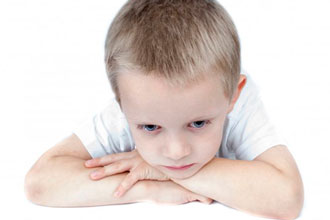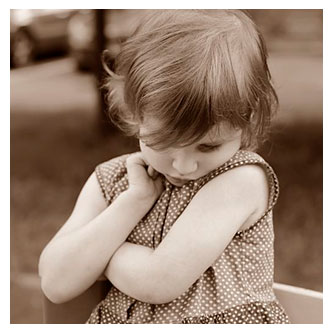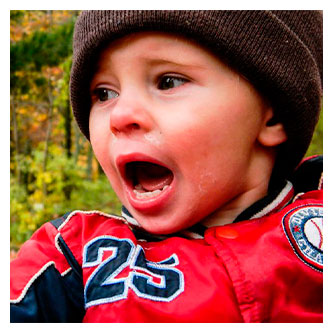Anger in children

How do I deal with my child's emotions and mine?
Give it to me!
It's mine!
I do not want!
I didn't want it that way, I don't like it, (sighs with great feeling and cries) ...
It's mine and nobody else's, I don't want my toys to be touched ...
Mom, Mom, Mom! Trust me mom (screams and cries; they want things immediately) ...
Does this sound familiar to you?
Children being people who are beginning the pleasure of being alive still do not control emotions, they generate many and this means that it is normal, since being new to the world of dealing with other people and learning everything about their environment requires learning and of the love of their parents or educators to learn it in a positive way towards them, without thinking of the good of the adult or of us as responsible for this being carried out. It is normal to have a tantrum, or to get angry because it means that they are developing a personality, and they deserve to be guided so that they do not get lost on the way.
You have to understand that we are all different and there will be stronger tantrums than others, and that indeed there is a genetic load in this, but it is also something natural, it is a life process, just as each flower grows differently and sometimes it seems to be it will wither and then out of nowhere it blooms, the same thing happens when you see your child all out of control, and you feel that he is the most restless child in the universe, when your universe is probably less than a thousand children.
It is your son, no one else knows him better than you, and if not, there are professionals who support or guide you, without confusing that the heart should come before the brain, what does the heart tell you when your son yells at you to let him go and does not want to follow your orders?
Everything revolves around a spiral of tantrums, screaming, crying and stress.
Infants do not understand why, the family does not understand it and ignores it.
We tend to fear the anger of our children, we see it as something wrong or harmful; And when they often express it in a primitive way (kicking, screaming, throwing themselves to the ground), we can't stand it. We are not able to understand that they are at that stage of their emotional development in which anger is expressed in this way, and that all they need is their calm and empathetic parents accompanying and understanding their anger, acting as emotional guides, not as guides. judges.
It is impossible to teach calm in those moments, if we do not have it.
It is impossible to prevent children from getting angry, to make them understand that it is normal, that it happens to all of us, we can prevent anger from controlling us, it is not that children cannot control their anger, it is that they do not know!
Children find it difficult to keep their emotions at bay, to control aggressiveness, remain calm and not lose their nerves, it is necessary not to raise the voice gives children the feeling that parents maintain control without losing authority, if We react with great fuss, we reinforce their behavior, we teach them that shouting will fix things. They do not react equally to stimuli, being excited or calm; It is essential to give them time, leave the room and do not speak until they have completely calmed down, take them in your arms and take them to a different room with the contact they will gradually calm down, become distracted and / or focus their attention on something else.
"Rather than explain why life is normally difficult, I would like to conclude with a friendly suggestion. Have full confidence in your child's ability to play. If a child plays, if a child can enjoy playing, either alone or in the company of other creatures, no serious difficulties lie ahead. If you use a rich imagination in play and take pleasure in activities that depend on accurate perception of external activity, you may feel quite happy, even if your child gets wet in bed, stutters, has tantrums, or has repeated fits of anger or depression Playing shows that this child is capable, in a reasonably satisfactory and stable means of developing a personal way of life and eventually becoming a well-rounded human being, desired as such and well received by the world at large. "
"Donald W. Winnicott"
Techniques to work anger and anger with children

![]() Help them to recognize situations in which they get angry.
Help them to recognize situations in which they get angry.
![]() Tell them stories that talk about their situation (without reaching the claim).
Tell them stories that talk about their situation (without reaching the claim).
![]() Make them reflect on the consequences of anger.
Make them reflect on the consequences of anger.
![]() Do not respond to their anger with an anger (be careful how you react with adults, they imitate, do not forget).
Do not respond to their anger with an anger (be careful how you react with adults, they imitate, do not forget).
![]() Help them calm down perhaps with music or a favorite activity.
Help them calm down perhaps with music or a favorite activity.
![]() Reinforce their achievements, (remind them what they have done perfect, by themselves).
Reinforce their achievements, (remind them what they have done perfect, by themselves).
Use a balloon and fill it with air
Anger fills the balloon, we let the balloon deflate so it doesn't explode, I close my eyes and breathe deeply, focusing on the breath, every time we release the air we imagine the balloon deflating. We change the thoughts that are in our head for pleasant thoughts, we think of something that we like. We talk and explain those feelings and thoughts, without getting upset. When we get upset, we breathe again with our eyes closed.
The anger box
We think of something that makes us very angry and we open the box. The anger inside the box is symbolized by a cloth that I put on top of it and it takes hold of me and does not allow me to see or think clearly.
When I have the cloth (anger) on top of me, I collide with others, I accidentally throw things away, I'm confused because I don't see reality, like when I'm very angry. When I have the cloth (he sits down to meditate and can take it off).
"When we meditate, anger disappears."
Anger doodle
We take a paper and paints to draw. We think about the anger and begin to scribble very fast and loud, meaningless, while we shout so that our anger comes out of us towards the drawing. When we are done we grab the paper and tear it into pieces so that the last bit of anger that was left is removed. What liberation!
Draw and write
We can draw something concrete that occurs to us at that moment, or do something free and abstract that we feel. And if they are older children, help them write how they feel. They release a lot of anger and anger through written words, and it makes them better control the situation before it overwhelms them. We can give you the option of breaking the anger so that you really believe that by breaking it the anger disappears.
Parents' attitudes

![]() Avoid facing and yelling when your child is angry.
Avoid facing and yelling when your child is angry.
![]() Don't try to reason when emotions are overflowing.
Don't try to reason when emotions are overflowing.
![]() Do not hit him, under any circumstances.
Do not hit him, under any circumstances.
![]() If necessary, walk away until you regain control.
If necessary, walk away until you regain control.
![]() Avoid threatening exaggerated punishment.
Avoid threatening exaggerated punishment.
![]() Reinforce the importance of maintaining mutual respect.
Reinforce the importance of maintaining mutual respect.
![]() Keep the lines of communication open.
Keep the lines of communication open.
I remember when I was a child, that I always kept my emotions and feelings to myself. For fear of my parents' reaction, as they were strong-willed; my parents did not know how to approach the situation that is the great reality. They didn't know how to deal with my brother's emotions or mine, or their own.
And like them, many more families go through the same thing.
It is difficult to stay with that anguish crushing your chest when being misunderstood or not even given the opportunity to express it, I do not wish it to anyone.
Never put aside what your child may be feeling, accompany him, always listen to him, and of course give him a hug, let him know that despite everything you are there and love him.
Every child deserves to be heard, understood and above all loved.
If we want our children to be able to tell us how they feel, we must create a climate of trust and harmony, where they feel that they can express themselves knowing that their emotions will not be questioned or invalidated.
We are a model and pattern to follow, children need us more than ever, let us accompany them in each of their stages. Working together with them on emotional regulation.
The stage of tantrums is good and poor for the child who does not pass it, because that means that he does not have his own ideas or that they have crushed him so much that he has already stopped defending them.
-Rosa Jové-
Bibliography: Como manejar la rabia y el enfado
Tania García (2020) ¿Qué necesito cuando me enfado?. Penguin Random House Grupo Editorial España
Texts: Mariela Castellón - Child psychology
Images pxhere.com
Within our babysitting services, we care about the health and development of your little one, that is why every day we prepare to offer a quality service: always taking a human and professional approach by the hand.
"Nanny Heart - The plus of mom your child needs"
- Details
- Hits: 1412
© Nanny Heart 2022 - Website design MGF Creative Solutions. - Políticas de cookies y privacidad


